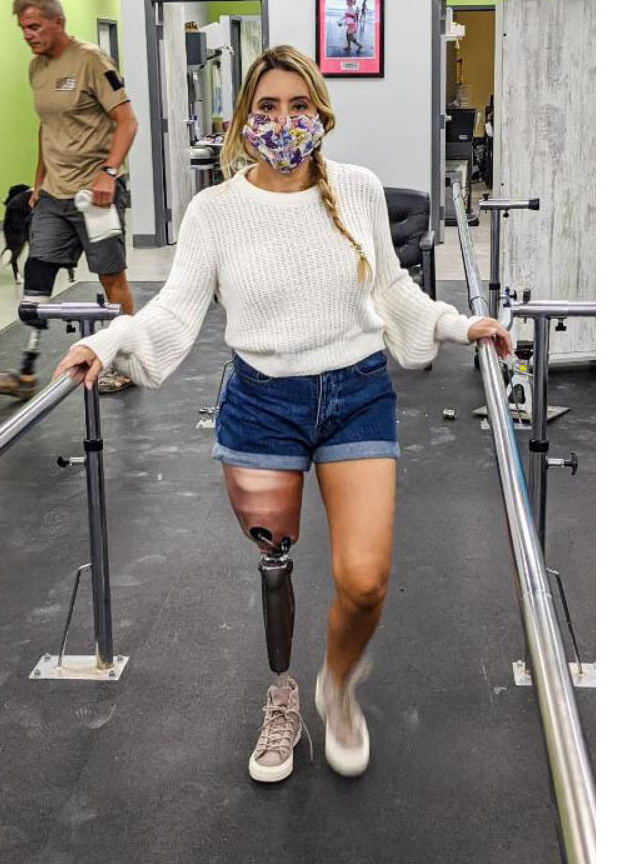In the course of researching our piece about Fair Insurance for Amputees last week, we came across Limbitless Sunshine, a relatively new blog by Alexandra Boutté. The title fits, because Boutté is bright and warm despite having survived a cancer recurrence and a right above-knee amputation within the last year, with a pandemic thrown in for extra thrills. “Here I am, one leg less,” she writes. “But there is nothing less about me.”
Boutté has kept on smiling even though her insurer, Cigna, denied coverage for the prosthesis her medical team recommended. She blogged about the situation last month, and it’s a textbook example of why Fair Insurance laws are so necessary. We asked Boutté for permission to republish her article, which she graciously allowed. The original post is at Boutté’s website. Enjoy it below, and check out more of her journey at Limbitless Sunshine and on Instagram at @limbitlesssunshine. (Image courtesy of Alexandra Boutté.)
Did I ever think I would be sitting around five months post-amputation without a prosthetic of my own? Not in my wildest dreams. Yet here I am. Health insurance: Can’t walk with it, can’t walk without it.

The very first thing I did once I had processed the shock of learning I would need an amputation is research. I read countless articles about the surgery itself, recovery, and what I should expect once I was ready for my first prosthetic. I visited several prosthetic clinics, I called my insurance provider, and I read the details of my policy thoroughly. I thought I did everything right. I knew I wanted a microprocessor knee based on my mobility needs, and I was assured this would be no problem.
This gave me peace of mind through my early recovery, when I was so anxious to walk again. My prosthetist taught me how to walk with an Ottobock C-leg 3, as it was the style he felt I would do best with. I focused on learning about all the things others had achieved with this kind of prosthetic. A microprocessor would give me much more stability than a more basic style of prosthetic. Since microprocessor technology is being approved for people in their 70s who are still somewhat active, I assumed it would surely be approved for someone in her mid-30s.
It took what felt like ages to finally hear back from my insurance, and it wasn’t the news I was expecting. I had been denied due to “a lack of medical necessity for a microprocessor-style knee.” I knew that this must be a mistake. I told myself not to panic and proceeded to call Cigna myself. I was told that my policy did not include power devices and only allowed for a “basic” prosthetic. I explained that the prosthetic ordered by my clinic was actually not a power device and that this is a common misconception. A power device is designed to replace muscle activity and uses sensors to respond with movement. Microprocessor knees adjust the swing phase of the knee to provide you with a more natural and stable walking pattern. Unfortunately, many insurance providers are not familiar enough with these devices to understand the difference. I was told I would need to file an appeal, which would take an additional three to six months.
After an emotional day of self-pity and far too much pizza, I thought: Why am I just accepting “no” so easily? Sure, it may not work out. I may not end up with the exact prosthetic I want for now, but I am not going to sit around feeling bad for myself. And I am not simply going to accept the explanation of someone who sounds unsure about exactly what my policy includes.
I have since reached out to my doctor for additional documentation of medical necessity and am working with my prosthetic clinic to clarify the specific language of my policy details. If you have insurance through your employer, you may not be aware that your HR department has a representative assigned to be your advocate and help you with any concerns regarding your insurance policy. I encourage you to use this benefit, as advocates are generally knowledgeable and can have more power than an individual patient when it comes to influencing your provider.
Were it not for the team at my incredible clinic, I would still be on crutches. But they have loaned me a C-leg so I can keep learning to walk on it while I’m sorting out my insurance. She may not be my own, but I felt she deserved a name since she has taught me so much. Her name is Lucy, and I try to care for her as best I can…except for that one time I took her out of town and forgot her charger, so her battery died and I had to drag her around looking like a zombie.
For those of you fighting to get equipment, treatment, or medication covered by your insurance provider, do not give up. Do your research, talk to your doctor, and fight for what you deserve. Learn as much as you can about what your rights are. This is your life and your mobility, after all.
I know it can be so hard to stay positive when you feel like everything is stacked against you. I know that it can feel impossible to go on at times. Still, I want you to fight even harder for your spirit than you do for a prosthetic. Work to make your own happiness, because there will always be challenges and there will always be moments of defeat. It is up to you to pick yourself up, crutches and all, and look for sunlight.